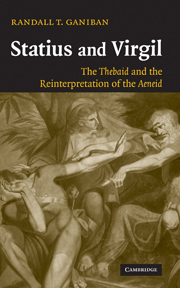Book contents
- Frontmatter
- Contents
- Preface
- List of abbreviations
- 1 Introduction
- 2 Oedipus' curse
- 3 Horror, prophecy, and the gods
- 4 Hypsipyle's narrative of nefas
- 5 Bacchus and the outbreak of war
- 6 Dis and the domination of hell
- 7 Delay and the rout of Pietas
- 8 Spectacle, crime, and monarchy at Thebes
- 9 Pietas, burial, and clementia in a world of nefas
- Works cited
- General index
- Index locorum
2 - Oedipus' curse
Published online by Cambridge University Press: 22 September 2009
- Frontmatter
- Contents
- Preface
- List of abbreviations
- 1 Introduction
- 2 Oedipus' curse
- 3 Horror, prophecy, and the gods
- 4 Hypsipyle's narrative of nefas
- 5 Bacchus and the outbreak of war
- 6 Dis and the domination of hell
- 7 Delay and the rout of Pietas
- 8 Spectacle, crime, and monarchy at Thebes
- 9 Pietas, burial, and clementia in a world of nefas
- Works cited
- General index
- Index locorum
Summary
The Thebaid opens with an infernal burst of horror. Oedipus – hands bloodied, eyes torn out – prays for the Fury Tisiphone to punish his sons for their maltreatment of him. His resulting curse, filled with all the violence and horror characteristic of early Imperial epic, sets in motion the events of the Thebaid. In this chapter I will examine Oedipus' speech at the opening of the epic both to demonstrate that it, like the Coroebus episode, is a programmatic passage that creatively engages with the Aeneid, and to show how this engagement is written into the poetics of the Thebaid.
INTRODUCING OEDIPUS: IMPIETY, MADNESS, AND NEFAS
impia iam merita scrutatus lumina dextra
merserat aeterna damnatum nocte pudorem
Oedipodes longaque animam sub morte trahebat.
illum indulgentem tenebris imaeque recessu
sedis inaspectos caelo radiisque penates
seruantem tamen adsiduis circumuolat alis
saeua dies animi, scelerumque in pectore Dirae.
(1.46–52)Having already dug out his impious eyes with his guilty hand, Oedipus plunged his shame damned in eternal night and was protracting his life in a long death. As he indulges in darkness in the innermost recess of his home, and occupies a dwelling unseen by the sky and the sun's rays, the cruel daylight of his mind flies around him with untiring wings, and in his heart are the Furies of his crimes.
The Thebaid could not have opened with a more horrific figure. Oedipus is a character of impossible contradictions.
- Type
- Chapter
- Information
- Statius and VirgilThe Thebaid and the Reinterpretation of the Aeneid, pp. 24 - 43Publisher: Cambridge University PressPrint publication year: 2007



